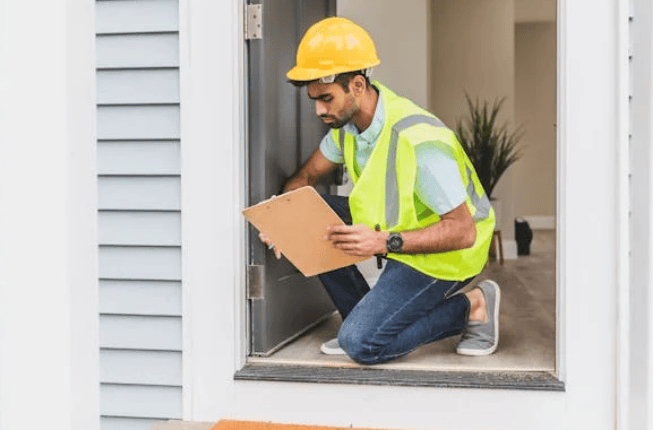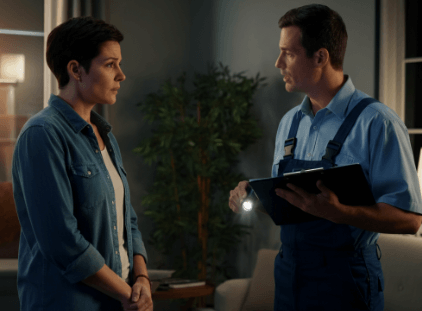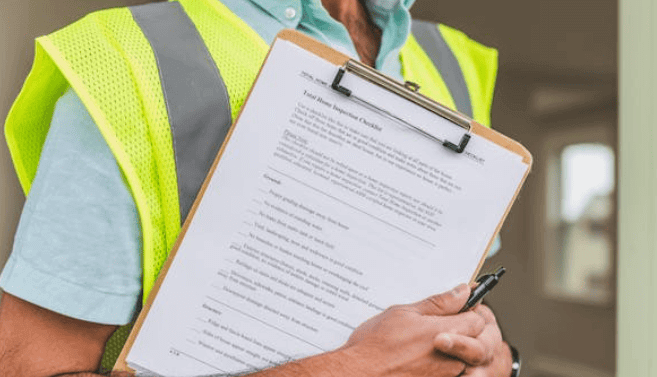Buying a home is one of the most significant investments, and ensuring its condition is crucial before finalizing any purchase. A skilled home inspector offers indispensable insights into the property’s condition, revealing potential issues that may elude the untrained observer. However, to get the most out of your inspection, knowing the right questions to ask a home inspector in Florida is essential. In this blog, we’ll cover the top 20 questions to ask a home inspector in Florida. From understanding structural integrity to checking for specific regional concerns like flood zones and termite activity, being well-prepared with these questions to ask a home inspector in Florida will arm you with the knowledge needed to make an informed decision.
Real estate investors Steve Daria and Joleigh emphasize the importance of being thorough during a home inspection in Florida. They recommend focusing on general structural concerns and specific issues unique to the region, such as termite activity and flood risks. Leveraging their extensive experience, Steve and Joleigh attest that asking the right questions can significantly impact your investment’s success.
Why Home Inspections Matter More in Florida
Living in Florida presents unique challenges, including exposure to hurricanes, high humidity, and frequent heavy rainfall.
Given these conditions, a home inspection is not just a formality but an important step in protecting your investment.
A thorough inspection can reveal hidden issues such as water damage, mold, or structural weaknesses that may not be immediately visible but could lead to significant and costly repairs in the future.

20 Questions to Ask a Home Inspector in Florida
In a state with such diverse environmental conditions, understanding the specific questions to ask a home inspector in Florida can help ensure that all potential problems are identified and addressed.
Here are some:
1. How Long Have You Been Inspecting Homes in Florida?
Experience matters, especially in a state like Florida, where environmental factors can significantly impact a property’s condition.
An experienced inspector will know what specific issues to look for in this region.
- Example: A seasoned inspector will be familiar with common problems like termite damage and mold growth due to Florida’s humid climate.
2. Are You Licensed and Insured in Florida?
Always ensure your home inspector is both licensed and insured.
In Florida, inspectors must meet specific criteria to obtain a license, ensuring they are qualified to assess your property accurately.
- Example: Verify their license number online through the Florida Department of Business and Professional Regulation.
3. What Does Your Inspection Cover?
Knowing the scope of the inspection is crucial.
Make sure it includes essential components like the roof, foundation, electrical systems, plumbing, HVAC, and more.
Example:
- Roof inspection for hurricane damage.
- Checking the foundation for cracks and stability.
- Evaluating the electrical systems for safety and compliance.
4. Can I Attend the Inspection?
Attending the inspection permits you to ask questions in real time and gain a better understanding of the property’s condition.
Most inspectors will encourage your presence.
- Example: Observing the inspection can provide insights into minor issues that might not be included in the final report.
5. How Long Will the Inspection Take?
The time frame of the inspection can vary based on the property’s size and condition.
On average, a thorough inspection should take between two to three hours.
Example:
- Smaller homes may take around two hours.
- Larger properties may require up to four hours.
6. Will You Provide a Detailed Written Report?
A comprehensive report is essential for documenting the home’s condition.
Ensure the report includes photos, descriptions, and a summary of findings.
Example:
- Photos of damaged areas.
- Detailed descriptions of issues and recommended repairs.
7. What Are the Common Issues You Find in Florida Homes?
Understanding common problems in Florida homes can help you prioritize what to look for during the inspection.
Example:
- Moisture-related issues like mold and mildew.
- Termite infestations.
- Hurricane or storm damage.
8. How Do You Check for Water Damage?
Water damage can lead to extreme structural issues and health hazards.
Knowing how the inspector checks for water damage is crucial.
Example:
- Inspecting for water stains on ceilings and walls.
- Checking the basement or crawl space for dampness.
- Using moisture meters to detect hidden moisture.
Get An Offer Today, Sell In A Matter Of Days…
9. How Do You Inspect the Roof?
The roof is one of the most critical components of a home.
Ensure the inspector will check for any signs of damage, wear, or potential leaks.
Example:
- Checking for missing or damaged shingles.
- Inspecting the attic for signs of leaks.
- Evaluating the overall roof structure.
10. How Do You Assess the HVAC System?
A well-functioning HVAC system is essential for comfort and energy efficiency.
Ensure the inspector will thoroughly evaluate it.
Example:
- Checking for proper installation and maintenance.
- Inspecting ductwork for leaks or damage.
- Testing the system’s efficiency.
11. Do You Test for Radon?
Radon gas has no color and odor kind of gas that can pose serious health risks.
Ask if radon testing is included in the inspection.
Example:
- Using radon test kits to measure levels.
- Providing recommendations if high levels are detected.
12. How Do You Inspect the Electrical System?
A thorough electrical inspection ensures the system is safe and up to code.
This is especially important in older homes.
Example:
- Checking the electrical panel for proper labeling and functionality.
- Inspecting outlets and switches.
- Evaluating the overall safety of the wiring.
13. What Do You Look for in the Plumbing System?
A functional plumbing system is vital for everyday living.
Ensure the inspector will check for leaks, clogs, and other issues.
Example:
- Inspecting pipes for leaks or corrosion.
- Checking water pressure and flow.
- Evaluating the condition of water heaters.
14. How Do You Inspect for Termites and Other Pests?
Florida’s warm climate makes it a hotspot for pests.
A thorough pest inspection is crucial for protecting your investment.
Example:
- Checking for termite damage in wooden structures.
- Inspecting for signs of other pests like rodents or insects.
- Providing treatment recommendations if pests are found.
15. What Safety Concerns Should I Be Aware Of?
Safety is paramount when buying a home.
Ensure the inspector will identify any potential hazards.
Example:
- Checking for fire hazards like faulty wiring.
- Inspecting for structural issues that could pose safety risks.
- Evaluating overall home security features.
16. Can You Explain the Severity of Each Issue?
Understanding the severity of identified issues helps prioritize repairs.
Ask the inspector to categorize problems as minor, moderate, or severe.
Example:
- Minor issues like cosmetic damage.
- Moderate issues like outdated wiring.
- Severe issues like foundation cracks.

17. Do You Offer Repair Estimates?
Some inspectors provide rough estimates for repair costs.
While these estimates may not be exact, they can give you a ballpark figure for budgeting.
Example:
- Cost to repair a leaking roof.
- Estimate for rewiring faulty electrical systems.
- Budget for treating termite infestations.
18. What Maintenance Tips Do You Recommend?
Preventative keeping can save you money in the long run.
Ask the inspector for tips on maintaining your home.
Example:
- Regularly cleaning gutters.
- Scheduling annual HVAC inspections.
- Look out for indications of wear and tear.
19. Can You Provide References?
References from prior clients can give you confidence in the inspector’s abilities.
Don’t hesitate to ask for them.
Example:
- Contacting past clients to ask about their experience.
- Reading online reviews and testimonials.
- Checking ratings with the Better Business Bureau.
20. How Do You Stay Updated with Inspection Standards?
Home inspection standards evolve over time.
Ensure your inspector stays current with the latest practices and regulations.
Example:
- Continuing education courses.
- Membership in professional organizations like ASHI (American Society of Home Inspectors).
- Regularly attending industry conferences.
Conclusion
Selecting the right home inspector can make a significant difference in your home-buying or selling experience. By knowing the essential questions to ask a home inspector in Florida, you can ensure a thorough and accurate assessment of the property. This information will empower you to make proper choices and protect your investment.
**NOTICE: Please note that the content presented in this post is intended solely for informational and educational purposes. It should not be construed as legal or financial advice or relied upon as a replacement for consultation with a qualified attorney or CPA. For specific guidance on legal or financial matters, readers are encouraged to seek professional assistance from an attorney, CPA, or other appropriate professional regarding the subject matter.

